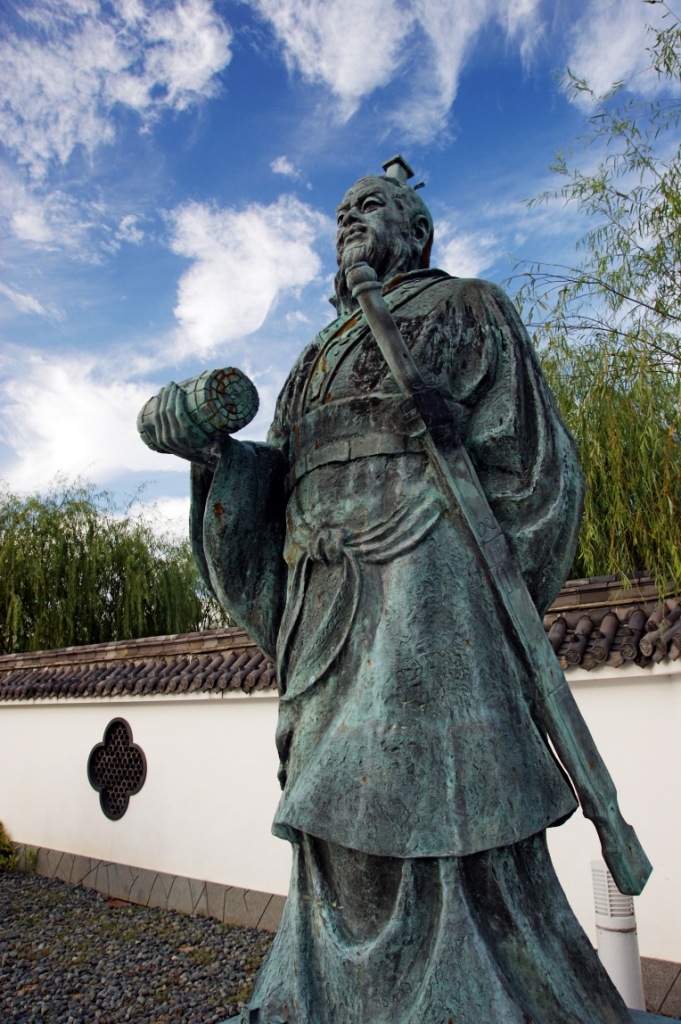Сунь Цзы знаменитые цитаты
Сунь Цзы Цитаты о войне
«Планирование нападения»
故上兵伐謀,其次伐交,其次伐兵,其下攻城。攻城之法為不得已。
«Искусство войны»
«Начальные расчеты»
兵者,詭道也。故能而示之不能,用而示之不用,近而示之遠,遠而示之近。
«Искусство войны»
«Начальные расчеты»
孫子曰:兵者,國之大事,死生之地,存亡之道,不可不察也。
«Искусство войны»
Сунь Цзы Цитаты о победе
„Непобедимость заключена в себе самом, возможность победы заключена в противнике.“
«Боевая форма»
不可勝在己,可勝在敵。
«Искусство войны»
„Возможность проиграть заключена в себе самом, возможность победы заключена в противнике.“
«Боевая форма»
不可勝在己,可勝在敵。
«Искусство войны»
Сунь Цзы цитаты
„Управлять многими — то же, что управлять немногими. Дело в организации.“
«Стратегическая мощь»
凡治眾如治寡,分數是也。
«Искусство войны»
„Тот, кто знает, когда он может сражаться, а когда не может, будет победителем.“
«Планирование нападения»
故知勝有五:知可以戰與不可以戰者勝。
«Искусство войны»
«Использование шпионов»
必索敵人之間來間我者,因而利之,導而舍之,故反間可得而用也。
«Искусство войны»
„Дурные качества и поступки человека зависят от него самого.“
Другие высказывания
«Девять местностей»
是故始如處女,敵人開戶,後如脫兔,敵不及拒。
«Искусство войны»
«Планирование нападения»
是故百戰百勝,非善之善也﹔不戰而屈人之兵,善之善者也。
«Искусство войны»
„Знай противника и знай себя, и ты будешь непобедим.“
«Искусство войны»
Источник: Мао Цзэдун, «Относительно противоречия», август 1937. — Входит в Красную книжечку (Цитатник Цзэдуна).
«Девять местностей»
兵士甚陷則不懼,無所往則固,深入則拘,不得已則鬥。
«Искусство войны»
Сунь Цзы: Цитаты на английском языке
Источник: The Art of War, Chapter XIII · Intelligence and Espionage
Variant translations
Hence to fight and conquer in all your battles is not supreme excellence; supreme excellence consists in breaking the enemy's resistance without fighting.
The best victory is when the opponent surrenders of its own accord before there are any actual hostilities... It is best to win without fighting.
Источник: The Art of War, Chapter III · Strategic Attack
Variant translations
A military operation involves deception. Even though you are competent, appear to be incompetent. Though effective, appear to be ineffective.
Источник: The Art of War, Chapter I · Detail Assessment and Planning
Lionel Giles translation
Источник: The Art of War, Chapter VI · Weaknesses and Strengths
“Secret operations are essential in war; upon them the army relies to make its every move.”
Источник: The Art of War, Chapter XIII · Intelligence and Espionage
“Where the army is, prices are high; when prices rise the wealth of the people is exhausted.”
Источник: The Art of War, Chapter II · Waging War
“Thus, what is of supreme importance in war is to attack the enemy's strategy.”
是故上攻伐谋
The Art of War, Chapter III · Strategic Attack
Вариант: Thus, what is of supreme importance in war is to attack the enemy's strategy.
Источник: The Art of War, Chapter XI · The Nine Battlegrounds
Источник: The Art of War, Chapter IX · Movement and Development of Troops
Источник: The Art of War, Chapter III · Strategic Attack
Источник: The Art of War, Chapter I · Detail Assessment and Planning
Источник: The Art of War, Chapter VI · Weaknesses and Strengths
“There is no instance of a nation benefitting from prolonged warfare.”
Источник: The Art of War, Chapter II · Waging War
“Hold out baits to entice the enemy. Feign disorder, and crush him.”
Источник: The Art of War, Chapter I · Detail Assessment and Planning
“Management of many is the same as management of few. It is a matter of organization.”
Источник: The Art of War, Chapter V · Forces
Источник: The Art of War, Chapter V · Forces
Источник: The Art of War, Chapter XI · The Nine Battlegrounds
"If his forces are united, separate them" is also interpreted: "If sovereign and subject are in accord, put division between them."
Источник: The Art of War, Chapter I · Detail Assessment and Planning
“One defends when his strength is inadequate; he attacks when it is abundant.”
Источник: The Art of War, Chapter IV · Disposition of the Army
Translation by Lionel Giles
Источник: The Art of War, Chapter XII · Attacking with Fire
“To see victory only when it is within the ken of the common herd is not the acme of excellence.”
Источник: The Art of War, Chapter IV · Disposition of the Army
“Victory is reserved for those who are willing to pay its price.”
Attributed to Sun Tzu in multiple books and internet sites, but this text does not appear in The Art of War and seems to be a more recent creation.
Disputed
(zh-TW) 孫子曰:國之上下,死生之地,存亡之道,不可不察也。
The Art of War, Chapter 1 · Detail Assessment and Planning
Alternative translation: Subtle and insubstantial, the expert leaves no trace; divinely mysterious, he is inaudible. Thus he is master of his enemy's fate.
Alternative translation: O divine art of subtlety and secrecy! Through you we learn to be invisible, through you inaudible and hence we can hold the enemy's fate in our hands.
The Art of War, Chapter VI · Weaknesses and Strengths
Контексте: Be extremely subtle, even to the point of formlessness. Be extremely mysterious, even to the point of soundlessness. Thereby you can be the director of the opponent's fate.
“WANG XI Opponents cannot exhaust you.”
The Art of War: Complete Texts and Commentaries
Источник: The Art of War, Chapter VI · Weaknesses and Strengths
Источник: The Art of War, Chapter XI · The Nine Battlegrounds
“Opportunities multiply as they are seized.”
Sun Tzu among many other military thinkers and leaders believed in fate and determination from the correct application of theory, the state of the opponent's and one's own power, and a code for the general and a code for the soldier to follow, rather than the Machiavellian type of intuition that evokes an evolution of opportunism that brought great historical consequences as it dominated over the classical and medieval ethical doctrines. Thus this statement is contrary to Sun Tzu principles. Nevertheless, there is a possible relation to the quote: Quickness is the essence of the war.
Misattributed
